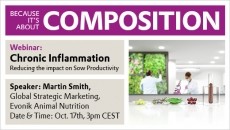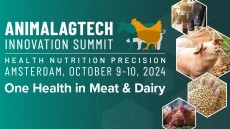Cargill: Next generation phytogenics can optimize animal performance

Cargill was already present in the phytogenic feed additive space, so acquiring Delacon and combining the capabilities of both companies has created a global market leader in that arena, said Gilles Houdart, director of the global feed additive business for the US agribusiness group, on a call with FeedNavigator.
Phytogenic feed additives comprise a broad range of herbs, plants, and their extracts, such as essential oils, to improve livestock and aquaculture performance and promote animal health.
Culture match is so important for a successful acquisition, particularly when it involves integrating a SME into a multinational organization, acknowledged Houdart. When it acquired Delacon, Cargill very quickly decided to integrate that team into a new global feed additive business unit, one that also includes its enzyme technologies, through its partnership with BASF, and its mycotoxin control products along with Diamond V’s portfolio, to ensure a feeling of community, of belonging.
The integration is progressing well, and Cargill has been seeing double digit growth in this space, said Houdart.
“All team members are focused on feed additive R&D for the global market.
“Firewalls have been established and reinforced between Delacon customers who may be competitors in the nutrition space with Cargill Animal Nutrition.”
Gut health
Dia-V MB Pro is the first product that Cargill has introduced into the market since the merger. It is targeted at broilers. “That product is under the Diamond V brand, but it contains very specific postbiotics and phytogenics; we saw some interesting synergies in the modes of action of those additives.”
Postbiotics and phytogenics each play a key role in distinct segments of the gut. “They work both on the higher part of the gut and the lower part of the digestive tract, helping mature the microbiota of the chicks faster.”
The Cargill team relies on the company’s Galleon microbiome analysis tool to monitor the effectiveness of that product. Available in Europe and some Asian markets, Cargill is working on registering Dia-V MB Pro globally.
A pipeline of opportunities
There are several other new product development (NPD) projects in play, he continued, that are leveraging the synergistic effects of combining specific postbiotics and phytogenics: “We brought our teams together and so now we have a full pipeline of opportunities in this area, in poultry and in other species.”
Through the Delacon deal, Cargill gained an extensive library of phytogenic compounds and expertise on their different modes of action – with those resources and insights, the team can create science-based solutions for customers, said Houdart.
“We are also dedicated to developing next generation phytogenics."
Exploring the microverse
Cargill is, of course, looking to address multiple unmet needs of producers, helping them improve the welfare of their herds and flocks, and to boost the sustainability of their operations, with industry facing ongoing challenges around piglet weaning stress, coccidiosis outbreaks in poultry, pressure to reduce methane emissions in ruminants, and nutrient waste in general, and farmers are also looking to do more with less and improve feed conversion.
The feed additives team, said Houdart, believes that gaining more in-depth understanding of the microbiome’s complex ecology – the microverse – will accelerate further growth, delivering the next frontier for animal productivity and sustainable supply.
“Micronutrition, as we call it, is a big focus for the new business unit, and we want to take a holistic approach to this, integrating micronutrition and health solutions with digital tools to better serve our customers.”


















